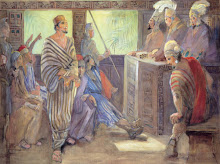I'm moving this blog. You may now read it HERE.
Enjoy
Tuesday, April 1, 2008
Jacob, Elder Maxwell, and The Problem of Being Sidelined
The time passed away with us, and also our lives passed away like as it were unto us a dream, we being a lonesome and a solemn people, wanderers, cast out from Jerusalem, born in tribulation, in a wilderness, and hated of our brethren.
Jacob 7:26
Jacob has always fascinated me. Well, I should qualify that, ever since I began to really seriously read and consider the texts of the Book of Mormon, Jacob has fascinated me. His personality is strikingly different from that of his older brother, Nephi. Both are unfaltering in their dedication to the doctrine of Christ and the building of a righteous nation, their attitudes about their situation in the land of promise differ a lot. Contrast the above with Nephi's claim that after settling into the land of promise and separating themselves from the Lamanites who were to be a scourge unto them that:
we lived after the manner of happiness.
2 Nephi 5:27
What to do with the paradox of mournful happiness painted by these brothers?
Maybe I've been coming close to the answer for a while now, but haven't really seen it. Without any particular research into the subject I have sensed that Elder Neal A. Maxwell had an affinity for the writings of Jacob. That sense expanded to the idea that Elder Maxwell and Jacob shared some traits in their teachings.
A favorite passage of Elder Maxwell's comes from Jacob 4:13:
the Spirit speaketh the truth and lieth not. Wherefore, it speaketh of things as they really are, and of things as they really will be.
More on the relationship between Jacob's attitudes and Elder Maxwell's after a few more words about Jacob as an individual.
Jacob was an intense person. He took his responsibilities to teach the people very seriously (see Jacob 1:19). His understanding of judgment was starkly black and white (see Jacob 6:5-10). Could I say that he was prone to hyperbole, or was it really just intensity (see 2 Nephi 9:44-49)? The picture I get of Jacob is that he struggled in mortality. His view was very much centered on the future state of happiness (or misery if you are wicked) that follows mortality. Even his son emphasized this aspect of his teachings (see Enos 1:3).
Jacob suffered from a strong case of what Elder Maxwell called "divine discontent" (I felt a sense of vindication in the claim that Elder Maxwell used this phrase when I did a search of Ensign past issues for the phrase and on the first page every talk/article was either written by Elder Maxwell, or the author was quoting him.). It seems that Jacob couldn't wait to get "on the other side" and to associate with those who had similar dedication to the word of the Lord. He just didn't fit in the temporal sphere very well. Having had very distinct experiences with the Divine (see 2 Nephi 2:3; 10:3) he had little patience for the hard-heartedness and stiff-neckedness of his generation. I wonder if he mourned out his days simply because he was tired of the superficial nature of mortality. He was anxious to do more for the Lord than call his people to repentance for things that caused him "to shrink with shame before the presence of [his] Maker" (Jacob 2:6).
I don't know how long Jacob lived after his older brother, Nephi, died, but it is almost as if he feels like he is sidelined with the futile responsibility of trying to lead a group of prideful people to repentance while Nephi gets to really be in the game.
I pull this analogy again from Elder Maxwell. In the biography written by Bruce C. Hafen about Elder Maxwell, he describes Elder Maxwell's attitude while suffering from cancer and unable to get out of a hospital bed as feeling like he was sidelined in the game of the work of the Lord. He wanted terribly to get in the game, whether on the one side of the veil or the other, it didn't matter, so long as he could contribute somehow.
Elder Maxwell was certainly one to be anxiously engaged in the good cause of moving the work of the Lord forth. So was Jacob. Though they may have been separated by time and space in many ways, yet they shared this anxiety, and both recognized the fleetingness of mortality and things that are considered of value in mortality. They both sought to understand things as they really are, and struggled through this life haunted by divine discontent.
Nephi maybe just felt happier than Jacob because he finally was free of the torments of his older brothers...
Or maybe that specific question about their attitudes is a topic for another day.
Subscribe to:
Comments (Atom)
